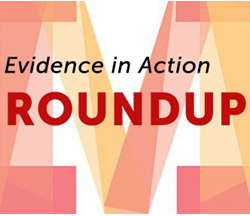
Join us for our latest stroll through the Evidence in Action team’s blog feed. Reminder: Inclusion in the roundup is not an endorsement—it’s simply food for thought.
What Did I Learn About the Demand for Impact Evaluations at the What Works Global Summit? (Evidence Matters blog)
Policymakers, researchers, donors, and others gathered to explore trends in impact evaluations of programs around the world. Emmanuel Jimenez, executive director of the International Initiative for Impact Evaluation, reports on the discussions.
There are at least three factors that may be constraining the demand for new impact evaluations: the difficulty in understanding and applying lessons across contexts, their “high price,” and the different incentives for commissioning new impact evaluations.
Value Added Is a Chainsaw (Ed Impact blog)
Steve Glazerman, director of Mathematica’s Educator Impact Lab, digs into the problem of how to understand the usefulness of value-added measures (VAMs)—the controversial methods used to estimate the impact of teachers on student test scores.
On the one hand, value-added measures, like chainsaws, can be powerful tools and really useful for the right problem, like cutting down a tree. On the other hand, chainsaws, like VAMs, can do a lot of damage if you’re not careful and don’t know what you’re doing.
Urban Institute researchers Sarah Gillespie and Mary Cunningham urge Congress to examine the evidence in deciding whether the U.S. Interagency Council on Homelessness (USICH) should continue beyond next year.
The work to end and prevent homelessness is far from over. If USICH sunsets in 2017, it will leave behind a long to-do list that that could not be absorbed by other agencies.
Social Science Insights to Advance a Culture of Health (Health Affairs blog)
The Culture of Health initiative launched by the Robert Wood Johnson Foundation raises questions about how best to define the concept of culture in the context of improving America’s health and well-being, say professors Daniel Dohan of the University of California-San Francisco and Corey Abramson of the University of Arizona.
The U.S. continues to lag its global peers in overall health and in health equity. A dynamic movement focused on a culture of health could help address the societal inertia that has for decades stymied efforts to close these gaps. But the pivot to culture also introduces perils. Culture is a tricky concept that both reflects and emerges from social inequalities.
Fathers Play a Pivotal Role in Their Children’s Early Educational Experiences (New America blog)
Lara Burt, an intern with the New America Foundation’s Family-Centered Social Policy program, collects research on the importance of fathers in early childhood development. (For another take, listen to Mathematica’s Ankita Patnaik talk about her research on paternal leave policies.)
Fathers and father figures play a key role in the healthy development of their children and have important and unique contributions to make to their Head Start communities. Yet, fathers aren’t always included as they should be, a problem which extends more broadly into policy areas such as childcare and the work-life balance debate.


